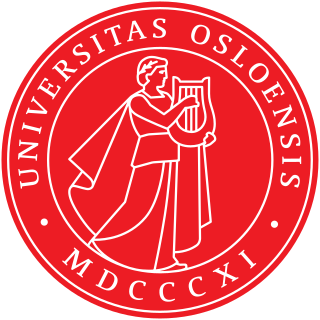
The University of Oslo is a public research university located in Oslo, Norway. It is the oldest university in Norway and consistently considered the country's leading university, one of the highest ranked universities in the Nordic countries and one of world's hundred highest ranked universities. Originally named the Royal Frederick University, the university was established in 1811 as the de facto Norwegian continuation of Denmark-Norway's common university, the University of Copenhagen, with which it shares many traditions. It was named for King Frederick VI of Denmark and Norway, and received its current name in 1939. The university was commonly nicknamed "The Royal Frederick's" before the name change, and informally also referred to simply as Universitetet.

The Ministry of Culture is the government department of Greece entrusted with preserving the country's cultural heritage, promoting the arts, and overseeing sport through the subordinate General Secretariat for Sports. The incumbent minister is Lina Mendoni. The Deputy Minister is Christos Dimas.

The Ministry of Education, Culture, Sports, Science and Technology is one of the eleven ministries of Japan that composes part of the executive branch of the government of Japan. Its goal is to improve the development of Japan in relation with the international community. The ministry is responsible for funding research under its jurisdiction, some of which includes: children's health in relation to home environment, delta-sigma modulations utilizing graphs, gender equality in sciences, neutrino detection which contributes to the study of supernovas around the world, and other general research for the future.

Shiraz University is a public university located in Shiraz, Fars, Iran, established in 1946. Being one of the oldest and most prestigious modern universities in Iran, Shiraz University is listed among the top three research-oriented schools in the nation according to a ranking of Iranian universities based on scientific output. In the first report of state universities ranking and among almost 70 universities and higher education institutes, Shiraz University is regarded as first-level university.
A culture minister or a heritage minister is a common cabinet position in governments. The culture minister is typically responsible for cultural policy, which often includes arts policy and measures to protect the national heritage of a country and cultural expression of a country or subnational region. This responsibility usually manifests in the accompanying ministry, governing the following:
The Cabinet of Malaysia is the executive branch of the Government of Malaysia. Led by the Prime Minister, the cabinet is a council of ministers who are accountable collectively to the Parliament. According to the Article 43 of the Federal Constitution, members of the Cabinet can only be selected from members of either houses of Parliament. Formally, the Yang di-Pertuan Agong appoints all Ministers on the advice of the Prime Minister. The constitution is amended by repealing the Clause (8) of Article 43, enabling a person who is a member of State Legislative Assembly to continue to serve even while serving as a minister or deputy minister in the cabinet. Ministers other than the Prime Minister shall hold office during the pleasure of the Yang di-Pertuan Agong, unless the appointment of any Minister shall have been revoked by the Yang di-Pertuan Agong on the advice of the Prime Minister but any Minister may resign from office. In practice, the Yang di-Pertuan Agong is obliged to follow the advice of the Prime Minister on the appointment and dismissal of ministers.

The Ministry of Education, Culture and Science is the Dutch Ministry responsible for education, culture, science, research, gender equality and communications. The Ministry was created in 1918 as the Ministry of Education, Arts and Sciences and had several name changes before it became the Education, Culture and Science in 1994. The Ministry is headed by the Minister of Education, Culture and Science, currently Eppo Bruins.

The Ministry of Culture, Sports and Tourism is a central government agency of South Korea responsible for the areas of tourism, culture, art, religion, and sports. It has two vice ministers, three assistant ministers, one commission, and over 60 divisions. The first Minister of Culture was novelist Lee O-young.
Ministry of Culture may refer to:
The Minister of Tourism is the head of the governmental department that specializes in tourism, recreation and/or culture.
An education minister is a position in the governments of some countries responsible for dealing with educational matters. Where known, the government department, ministry, or agency that develops policy and delivers services relating to sports are listed; overseen by and responsible to the education minister. The first such ministry ever is considered to be the Commission of National Education founded in 1773 in the Polish–Lithuanian Commonwealth.

The Royal Norwegian Ministry of Culture and Equality is responsible for cultural policy, regulations and other matters related to the media and sports, and equality and non-discrimination. The ministry was established in 1982, as the Ministry of Cultural and Science. Until then, the Ministry of Church and Education Affairs had had the overriding responsibility for cultural affairs in Norway. It is led by the Minister of Culture and Equality Lubna Jaffery (Labour) since June 2023. The Secretary-General of the ministry is Kristin Berge. The ministry reports to the Storting.
A science ministry or department of science is a ministry or other government agency responsible for governing scientific activities. The ministry is often headed by a minister specialising in scientific matters.

The Ministry of Education and Culture of Uruguay is the ministry of the Government of Uruguay that is responsible for the coordination of national education, the promotion of the country's cultural development, the preservation of the nation's artistic, historical and cultural heritage, as well as innovation, science and technology and the promotion and strengthening of the validity of human rights. It is also responsible for the development of the state communication multimedia system and for promoting the digitized access of the entire population to information.
The right to science and culture is one of the economic, social and cultural rights claimed in the Universal Declaration of Human Rights and related documents of international human rights law. It recognizes that everyone has a right to freely participate in culture, to freely share in science and technology, and to protection of authorship.
The state agencies that form Thailand's public sector consist of several types of functioning bodies. While some agencies established by mandate of the constitution are independent, others are directly or indirectly answerable to the executive of the Royal Thai Government. The majority of these are government agencies, which employ the civil service as well as the military. Others include public organizations and state enterprises.
Maneklal Sankalchand Thacker (1904–1979) was an Indian power engineer, academic and the director general of the Council of Scientific and Industrial Research, the largest research and development organization in India. He served as a secretary at the Ministry of Scientific Research and Cultural Affairs (1957–62) and sat in the Planning Commission of India as a member from 1962 to 1967. He was an elected fellow of the Indian Academy of Sciences and the Indian National Science Academy. The Government of India awarded him the third highest civilian honour of the Padma Bhushan, in 1955, for his contributions to literature and science education.

The Ministry of Education, Vocational Training and Sports (MEFPD) is the department of the Government of Spain responsible for proposing and carrying out the government policy on education and vocational training, including all the teachings of the education system except university education, without prejudice to the competences of the National Sports Council in matters of sports education. Likewise, it is also the responsibility of this Department the promotion of cooperation actions and, in coordination with the Ministry of Foreign Affairs, the promotion of international relations in the field of non-university education.

The Ukrainian Institute is a public institution of Ukraine that aims to represent Ukrainian culture in the world and form a positive image of Ukraine abroad. The institute was founded by the Cabinet of Ministers of Ukraine in 2017 and is affiliated with the Ministry of Foreign Affairs of Ukraine. It fully began its activities in the summer of 2018, after the appointment to the position of General Director Volodymyr Sheiko, as a result of an open competition and the creation of a team of specialists.









